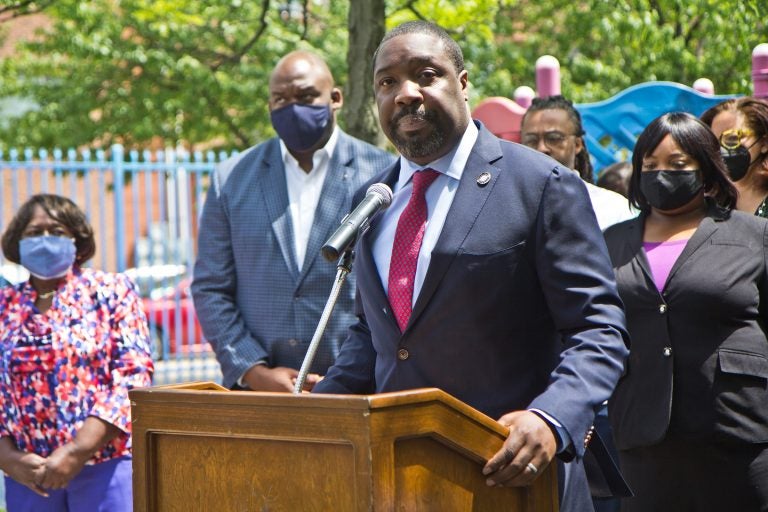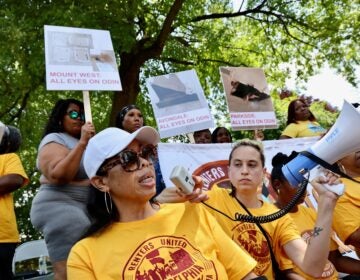Prosecution case winding down in federal bribery trial of Kenyatta Johnson
Prosecutors have called more than a dozen witnesses during eight days of testimony. The defense could begin its case as early as Monday.

File photo: Philadelphia city council member Kenyatta Johnson joined city leaders at an event at Hawthorne Recreation Center in South Philadelphia on June 1, 2021. (Kimberly Paynter/WHYY)
Brian Abernathy felt stuck.
By January 2014, nearly a decade after Universal Companies had agreed to develop a trio of city-owned lots, the valuable land in South Philadelphia remained vacant with no immediate plans to change that.
At the same time, City Councilmember Kenyatta Johnson stood opposed to the Redevelopment Authority reclaiming the parcel of properties from the nonprofit developer, even though it, along with the Philadelphia Housing Authority, had violated its contract with the city.
“If we reverted the property without the councilperson’s permission, we may have obtained the property and then not been able to convey it in the future,” said Abernathy on Monday, the eighth day of testimony in Johnson’s federal bribery trial.
Translation: Abernathy, then the authority’s executive director, didn’t want to cross Johnson out of fear the councilmember wouldn’t support the agency if it tried to resell the land on Bainbridge Street to another developer after completing a process known as reversion. A councilmember must introduce a resolution for the city or the authority to finalize any sale of public land.
So, Abernathy backed off.
“It would have a chilling effect,” he said.
Abernathy’s testimony came as the government began to wind down its case against Johnson and three co-defendants, including the Democrat’s wife, Dawn Chavous. Assistant U.S. Attorney Eric Gibson on Monday said his team plans to wrap things up on Thursday, meaning the defense could start calling its witnesses as soon as Monday.
The government has spent more than a week trying to convince jurors that Universal hired Chavous’ consulting company in May 2013 so it could conceal nearly $67,000 in bribes to Johnson. In exchange, prosecutors say Johnson helped the organization maintain control of real estate in his legislative district, including the lots on Bainbridge, which as of 2015 were valued at $4.3 million.
Johnson’s lawyer, Patrick Egan, argued Monday that Abernathy didn’t need Johnson’s support to start the reversion process — that the authority he led would have been completely in its right to take back the land from Universal and the housing authority.
“That’s actually a right that you build into the agreement,” said Egan. “As the executive director, you have a right to enforce that clause of the contract.
Abernathy agreed, calling his decision to walk away from reversion a “political calculation.”
Later in the day, prosecutors questioned several witnesses about Chavous’ consulting contract with Universal, which lasted approximately 16 months. The government alleges Chavous did “very little” work for the company, and prosecutors spent considerable time dissecting her time with Universal in an effort to prove that the payments she received from Universal were not compensation, but bribe money for her husband.
While cross-examining Portia Fullard, a former employee of Chavous’, defense attorney Barry Gross again pushed back on the government’s claim that his client was a “low-show” consultant working under a bogus contract.
He showed jurors a series of work emails, some of which were sent late at night or over weekends, where Chavous and Fullard were arranging tours of Universal’s charter schools with elected officials. Gross also asked Fullard about a pair of meetings she and Chavous had with Universal employees at the start of the consulting contract.
“If there was a fake contract, there would be no need for a meeting for what Universal needed,” said Gross to Fullard, who was granted immunity for her testimony.
Fullard called Chavous a “very hard worker.”
The government on Monday also questioned Steve Cobb, who worked as Johnson’s legislative aide between 2012 and 2016.
In his role, Cobb met several times with a small group of neighbors who opposed the redevelopment of the Royal Theater on South, a historic property Universal wanted to rezone so it could bring a mixed-use development to the site. But, the government tried to argue, he was not privy to conversations that resulted in Johnson introducing zoning legislation in 2014 on Universal’s behalf, prosecutors say — an official act the councilmember allegedly did in exchange for bribe money.
Cobb was also unaware that Johnson’s wife had a consulting contract with Universal while Johnson was pushing the bill for Universal. Cobb said he didn’t find that out until a pair of FBI agents told him in 2017.
“I was surprised,” said Cobb, adding that he would have liked to have known about Chavous’ contract.
“I think it might be something you’d want to get an ethics opinion about,” he said.
Testimony continues Tuesday.

Get daily updates from WHYY News!
WHYY is your source for fact-based, in-depth journalism and information. As a nonprofit organization, we rely on financial support from readers like you. Please give today.







